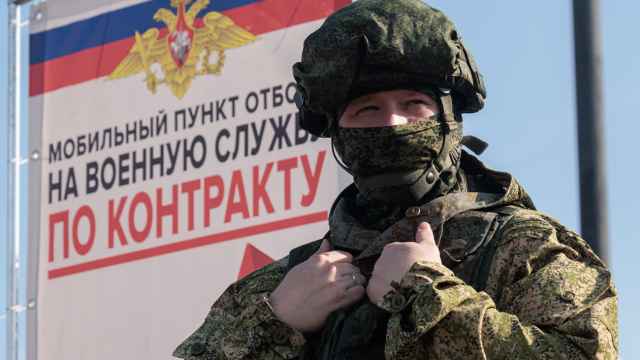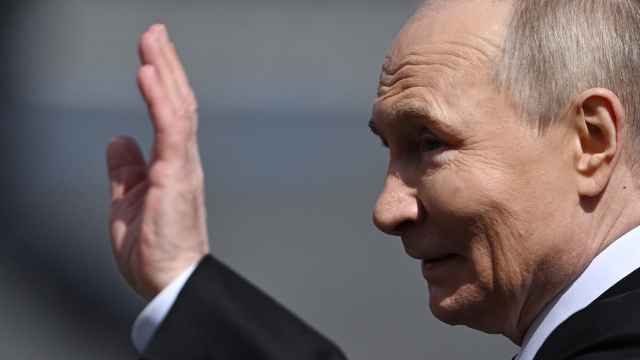Foreign minority shareholders in Eurasia Drilling, Russia's largest oil services firm, are being forced to sell their shares at a cut-price rate to Russian co-owners, an investor in the company said.
The accusation came after the company announced a proposal Thursday by a group of its managers and shareholders to buy out Eurasia Drilling and take it private for $10 per share — less than their current worth on the stock market.
The offer price — which values the company at $1.5 billion — would not only give a discount to the buyers, but it also comes less than 10 days after a $22-per-share takeover bid for Eurasia Drilling by Schlumberger, a major U.S. oil services firm, collapsed after a delay of several months in which Russian regulators failed to approve the deal.
A source close to Eurasia Drilling said the new would-be buyers were an all-Russian group led by Alexander Dzhaparidze, the company's billionaire founder and CEO, who already owns 30 percent of the firm. Dzhaparidze had not publicly commented on the proposal Thursday.
If the deal goes through, Eurasia Drilling will be repatriated and delisted from the London Stock Exchange — something the government recommended companies to do in the interests of “economic security” following a clash with the West over Ukraine last year.
The offer affects a clutch of Western investors, including U.S.-based Fidelity Management, Britain's Genesis Investment and Raiffeisen, an Austrian bank.
A source at one affected European investment fund, who wished to remain anonymous to avoid entering into conflict with Eurasia Drilling, said Thursday the buyout offer was unprecedented.
“Trying to take a company private at a discount to the market price may be a world first,” he said.
Since Russia offers few legal protections, there is little the minorities can do to avoid losing out.
“Dzhaparidze and his fellow controlling shareholders have made an audacious bid to secure their place in the Russian corporate governance Hall of Shame,” the investment fund source said.
“It's standard Russian intimidation tactics.”
A spokesperson for Eurasia Drilling, Andrew Hayes, rebuffed claims of impropriety. Eurasia Drilling has assembled an independent board to assess the offer and make recommendations to shareholders, he said.
However, investors say the controlling shareholders believe that under Cayman Islands law, which is being proposed for the deal, they can use their votes to push through the move.
Eurasia Drilling said Thursday that Renaissance Capital, an investment bank in Moscow, had been employed to assess the fairness of the offer. But Renaissance, which values Eurasia Drilling shares at $17, later said in a statement that it would not advise the company.
According to the European investment fund source, the initial reaction from Renaissance's traders to the announcement was to send out a message to their clients describing the bid as “sickening.”
The buyout proposal comes as Eurasia Drilling suffers the fallout of cheap oil. With crude prices around $50 — half their level in mid-2014 — oil companies have scaled back exploration. Russia is one of the world's top three oil producers, pumping more than 10 million barrels per day. But LUKoil, Russia's No. 2 oil producer and the company's main client, has sharply curtailed its commissions. Eurasia Drilling's dollar revenues fell 40 percent year-on-year in the first half of 2015, it said in August.
The shrinking services market has pushed Eurasia Drilling's stocks down around 45 percent this year. The share price declined again on Thursday's news, falling nearly 8 percent to $10.10 by early evening in Moscow — still higher than the offer price.
With the failure of the Schlumberger deal, which would have given the company an injection of funds, Eurasia Drilling said in a statement on Thursday that the buyout and delisting would enable a rationalization of the business “so it can sustain itself through the expected prolonged and difficult market conditions.”
If the plan is pushed through, minority shareholders could sue in the Cayman Island courts.
Thursday's offer is not the first episode of friction between Russian and foreign companies. Britain's BP had a famously testy relationship with a consortium of Russian billionaires in its joint TNK-BP project during the 2000s, which resulted in the Russians gaining control of the company and kicking Bob Dudley, its American boss, out of the country, before it was eventually sold to state-owned Rosneft in 2013.
According to Bloomberg, Russian regulators dragged their feet on approving Schlumberger's takeover of Eurasia Drilling over fears that the Texas-based company would gain too much control over Russia's oil industry.
Russia's legal framework is also fickle, and owners can be dispossessed. In the early 2000s, oil tycoon Mikhail Khodorkovsky was imprisoned for a decade and stripped of his Yukos empire. More recently, last year billionaire Vladimir Yevtushenkov was put under house arrest for several months as the state renationalized his oil firm, Bashneft.
Contact the author at p.hobson@imedia.ru
A Message from The Moscow Times:
Dear readers,
We are facing unprecedented challenges. Russia's Prosecutor General's Office has designated The Moscow Times as an "undesirable" organization, criminalizing our work and putting our staff at risk of prosecution. This follows our earlier unjust labeling as a "foreign agent."
These actions are direct attempts to silence independent journalism in Russia. The authorities claim our work "discredits the decisions of the Russian leadership." We see things differently: we strive to provide accurate, unbiased reporting on Russia.
We, the journalists of The Moscow Times, refuse to be silenced. But to continue our work, we need your help.
Your support, no matter how small, makes a world of difference. If you can, please support us monthly starting from just $2. It's quick to set up, and every contribution makes a significant impact.
By supporting The Moscow Times, you're defending open, independent journalism in the face of repression. Thank you for standing with us.
Remind me later.






